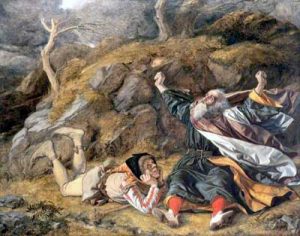I feel like I really started to understand King Lear in Acts 3 and 4. I had a general idea of what was going on in the story while reading the first two acts, but now I understand the deeper meaning. Some topics that stuck out to me were the focus on the storm and the idea of divine intervention.

I have been surprised throughout the whole play with how much Shakespeare discusses the storm. Sure, it makes a good setting for a dramatic story, but why else would he put so much effort into describing it? There must be a deeper meaning. I think that the storm may represent the excess of chaos and disarray in all aspects of the story. Also, the storm and King Lear’s sanity seem to mirror one another. Lear’s fall from sanity begins when he is locked out in the terrible storm. He raves directly to the storm, such as when he says “And thou, all-shaking thunder, smite flat the . . . world” (3.2.6-7). Lear also asks the storm to punish ungrateful men. I think that after being stuck out in the storm for a while, Lear is beginning to realize that he has been ungrateful for certain things in his life. He is starting to gain humility for his actions, especially against Cordelia. I think realization of what he’s done leads his mind further into chaos.
Lear also wishes divine punishment against those who have wronged him and begins to tell the storm how he doesn’t blame it for destruction like he blames his daughters. The theme of divine intervention and punishment continues into Act 4, when Gloucester tells Regan he wishes to see “winged vengeance overtake such children” (Regan and Goneril). Most characters in this story seem to believe in such things as fate and divine punishment. It is interesting to me that divine intervention and punishment is such a big theme in a tragedy like this, which usually focuses on human actions. The characters in King Lear seem to put most of the blame for tragic events on the cosmos, instead of on their own decisions.
